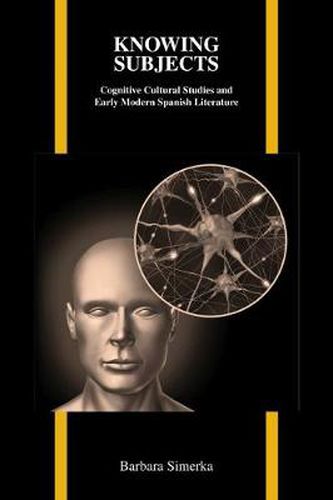Readings Newsletter
Become a Readings Member to make your shopping experience even easier.
Sign in or sign up for free!
You’re not far away from qualifying for FREE standard shipping within Australia
You’ve qualified for FREE standard shipping within Australia
The cart is loading…






In Knowing Subjects, Barbara Simerka uses an emergent field of literary study, cognitive cultural studies, to delineate new ways of looking at early modern Spanish literature and to analyze cognition and social identity in Spain from the late fifteenth to late eighteenth centuries. Simerka analyzes works by Cervantes and Gracian, as well as picaresque novels and comedias. Employing an interdisciplinary approach, she brings together several strands of cognitive theory and details the synergies among neurological, anthropological, and psychological discoveries that provide new insights into human cognition. Her analysis draws on theory of mind, the study of the cognitive activity that enables humans to predict what others will do, feel, think, and believe. Theory of mind explores how primates, including humans, conceptualize the thoughts and rationales behind other people’s actions and use those insights to negotiate social relationships. This capacity is a necessary precursor to a wide variety of human interactions, both positive and negative, from projecting and empathizing to lying and cheating. Simerka applies this theory to texts involving courtship or social advancement, activities in which deception is most prevalent, and productive. In the process, she uncovers new insights into the comedia (especially the courtship drama) and several other genres of literature (including the honor narrative, the picaresque novel, and the courtesy manual). She studies the construction of gendered identity and patriarchal norms of cognition, contrasting the perspectives of canonical male writers with those of recently recovered female authors such as Maria de Zayas and Ana Caro. She examines the construction of social class, intellect, and honesty, and in a chapter on Don Quixote, cultural norms for leisure reading at the time. Through her wide-ranging and stimulating study, Simerka shows how early modern Spanish literary forms reveal the relationship between an urbanizing culture, unstable subject positions and hierarchies, and social anxieties about cognition and cultural transformation.
$9.00 standard shipping within Australia
FREE standard shipping within Australia for orders over $100.00
Express & International shipping calculated at checkout
In Knowing Subjects, Barbara Simerka uses an emergent field of literary study, cognitive cultural studies, to delineate new ways of looking at early modern Spanish literature and to analyze cognition and social identity in Spain from the late fifteenth to late eighteenth centuries. Simerka analyzes works by Cervantes and Gracian, as well as picaresque novels and comedias. Employing an interdisciplinary approach, she brings together several strands of cognitive theory and details the synergies among neurological, anthropological, and psychological discoveries that provide new insights into human cognition. Her analysis draws on theory of mind, the study of the cognitive activity that enables humans to predict what others will do, feel, think, and believe. Theory of mind explores how primates, including humans, conceptualize the thoughts and rationales behind other people’s actions and use those insights to negotiate social relationships. This capacity is a necessary precursor to a wide variety of human interactions, both positive and negative, from projecting and empathizing to lying and cheating. Simerka applies this theory to texts involving courtship or social advancement, activities in which deception is most prevalent, and productive. In the process, she uncovers new insights into the comedia (especially the courtship drama) and several other genres of literature (including the honor narrative, the picaresque novel, and the courtesy manual). She studies the construction of gendered identity and patriarchal norms of cognition, contrasting the perspectives of canonical male writers with those of recently recovered female authors such as Maria de Zayas and Ana Caro. She examines the construction of social class, intellect, and honesty, and in a chapter on Don Quixote, cultural norms for leisure reading at the time. Through her wide-ranging and stimulating study, Simerka shows how early modern Spanish literary forms reveal the relationship between an urbanizing culture, unstable subject positions and hierarchies, and social anxieties about cognition and cultural transformation.